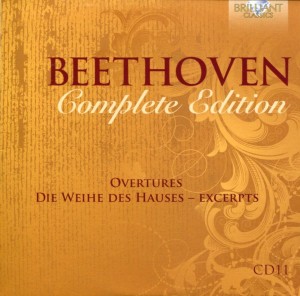 According to various sources, Beethoven wrote only one opera. (Which, truth be told, isn’t a bad thing, from my perspective. I’m not a huge fan of opera.)
According to various sources, Beethoven wrote only one opera. (Which, truth be told, isn’t a bad thing, from my perspective. I’m not a huge fan of opera.)
You can read background on Beethoven’s Leonore opera here. Or here.
From its entry on Wikipedia:
Fidelio (Leonore, oder Der Triumph der ehelichen Liebe: Leonore, or The Triumph of Married Love) (Op. 72) is a German opera with spoken dialogue in two acts by Ludwig van Beethoven. It is his only opera. The German libretto was prepared by Joseph Sonnleithner from the French of Jean-Nicolas Bouilly, which had been used for the 1798 opera Léonore, ou L’amour conjugal by Pierre Gaveaux, and the 1804 opera Leonora by Ferdinando Paer (a score of which was owned by Beethoven).
The opera tells how Leonore, disguised as a prison guard named “Fidelio”, rescues her husband Florestan from death in a political prison.
Sounds cheery enough.
Maybe that’s part of the reason why it wasn’t received well when it premiered. Another reason, according to Wiki, was this:
The success of these performances was greatly hindered by the fact that Vienna was under French military occupation, and most of the audience were French military officers. After this premiere, Beethoven was pressured by friends to revise and shorten the opera into just two acts, and he did so with the help of Stephan von Breuning. The composer also wrote a new overture (now known as “Leonore No. 3”; see below). In this form the opera was first performed on 29 March and 10 April 1806, with greater success. Further performances were prevented by a dispute between Beethoven and the theatre management.
Yeah. I can see that.
The other composition on Beethoven CD 11 is Die Weihe Des Hauses, which (in German) translates to “The Consecration of the House.”
According to its entry on Wikipedia,
The Consecration of the House (or Die Weihe des Hauses), Op. 124, is a work by Ludwig van Beethoven composed in September 1822. It was commissioned by Carl Friedrich Hensler, the Director of Vienna’s new Theater in der Josefstadt, and was first performed at the theatre’s opening on October 3, 1822. It was the first work Beethoven wrote after his revival of studying the works of J. S. Bach and Handel, and bears their influence.
Previously, in 1811, Beethoven had written The Ruins of Athens (Die Ruinen von Athen), Op. 113, incidental music for August von Kotzebue’s play of the same name, for the dedication of a new theatre in Pest. This same work was to be performed again in 1822 for the new theatre in Vienna. However, Carl Meisl, the commissioner of the Royal Imperial Navy, changed the texts of numbers 1, 6, 7, and 8 of Beethoven’s work. Beethoven was not pleased with the revision, and felt that the new text did not fit the music.
An anecdote by Anton Schindler describes Beethoven conceiving two themes for the overture while on a walk, and relates the composer’s intention of treating one of these in contrapuntal fashion after Handel. Beethoven chose a monothematic structure, in which a modulation occurs, but in which the new key features the same theme. This suggests the influence of Haydn.
Performers on today’s CD are:
Phyllis Bryn-Julson soprano
Bach Society of Minnesota
David Laberge conductor
David Laberge has an interesting pedigree. According to his bio on Wiki, he was born in born 1929 and “is a neuropsychologist specializing in the attention process and the role of apical dendrites in cognition and consciousness….His major extracurricular activity was to serve for 21 years as Music Director and Conductor of the Minnesota Bach Society Orchestra and Chorus from 1959 to 1980.”
Minnesota Orchestra
Stanislav Skrowaczewski conductor
The music of Leonore is actually quite compelling. It is dynamic (in typical Beethoven fashion) and melodic.
